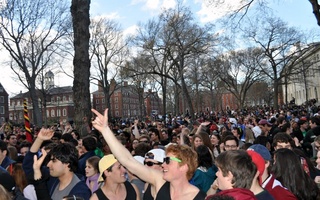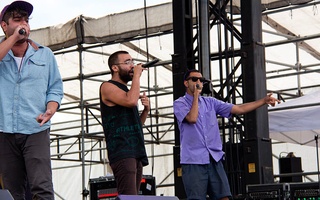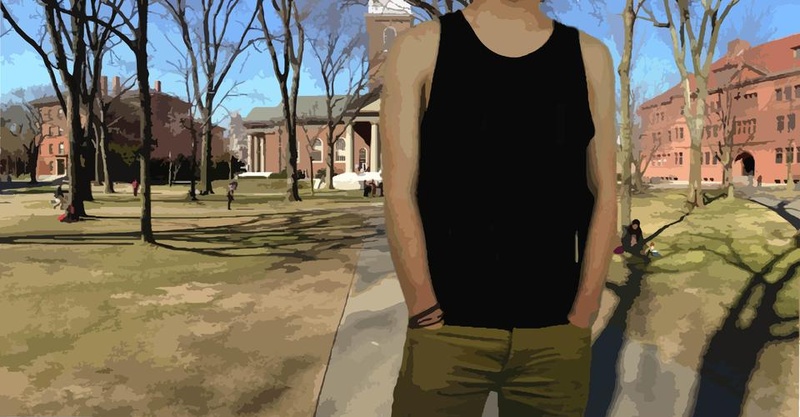On a Friday evening last April, 8,500 ticket-holders crammed onto the University of Pennsylvania’s Franklin Field. With the arena full to capacity, both undergraduates and guests raged to the beats of indie rock band Passion Pit and electronic dance music DJ Tiësto.
“I had no idea what I was going into,” says Jayshlyn D. Acevedo ’14, who attended Penn’s Spring Fling in 2012. “Penn, I think, is out of this world. I’ve never been to a state school, but I can’t even imagine it. That was absurd. Everyone’s involved and to the highest level.”
At Penn, Spring Fling represents more than just a concert that occurs on one night every year: it’s a highly anticipated celebration that lasts all weekend long.
The following Sunday of that same week last year, Harvard undergraduates gathered in Tercentenary Theater. When musical group Das Racist took the stage on the stairs of Memorial Church, they addressed the sparse crowd: “What’s up, you drunk overprivileged shits?” Harvard students were not amused.
Though outcry has erupted this year over the invitation of rapper Tyga to perform at Yardfest, this is not the first time there have been student complaints about Yardfest as a whole. While other colleges throw massively attended spring concerts, Harvard’s iteration consistently meets a more tempered reception.
The failure of Harvard’s Yardfest to garner strong support from students has been attributed to a number of factors—poor selection of artists, limited funds, administrative oversight, and lack of an overall party culture among them. Though there are a variety of logistical issues that have restricted student planners of the concert, it is the absence of an entrenched culture around Yardfest that speaks to a broader lack of cohesion among College students in regards to social life.
THE GOLDEN YEARS
The predecessor of today’s Yardfest originated in 1994, and the festival has since taken on different names and formats. In those nearly 20 years the event has evolved in fits and starts and an adequate source of funding and positive reception have never been certain.
Former Undergraduate Council President Carey W. Gabay ’94 conceived the concept of Yardfest in 1994 to unify the campus in a single event, following criticisms that he had done little to enhance social life at the College. However, the event—renamed Springfest in 1995—did not necessarily accomplish this task. For the next few years, low attendance rates and lack of funds plagued student planners.
Prospects brightened in 2002, when former University President Lawrence H. Summers offered to cosponsor Springfest, following the results of surveys showing a lack of community cohesion at the College.
“Larry Summers listened to these survey results, which were quite dramatic, and made a conscious effort to address the issue,” former director of the Harvard Concert Commission Justin H. Haan ’05 says.
Haan emphasizes the importance of the enhanced financial backing from the University on the success of these events.
“Without those funds there was no way the events could have occurred. Funding of this sort should be institutionalized,” Haan says.
In 2004, Busta Rhymes performed at the Lavietes Pavilion to a crowd of about 3,000 to strongly positive student feedback, and Bob Dylan rocked Gordon Track and Tennis Center to a sold-out audience of students and community members.
Read more in Arts
THUD to End Semester with a BangRecommended Articles
-
 Spring Concerts Around the Ivies
Spring Concerts Around the Ivies -
 YardFest: The Best Concert on April 15
YardFest: The Best Concert on April 15 -
Tyga Officially Announced as Yardfest HeadlinerTyga will headline this year’s Yardfest, according to an official announcement made by the College Events Board Wednesday evening nearly 20 hours after two students preemptively revealed the artist.
-
 "It's Going To Be Elegant, Dammit," Radcliffe Dance Organizers Promised in 1964
"It's Going To Be Elegant, Dammit," Radcliffe Dance Organizers Promised in 1964 -
Music "In Time of War"This Sunday, LGBT chorus Coro Allegro will perform their concert "...In Time of War," which will focuses on issues surrounding the armed forces. Works include Haydn's "Mass in Time of War" and a musical setting of a soldier's last letter home.
-
Tyga Retained as Yardfest Headliner with Start Time DelayedThe College Events Board and the Harvard College Concert Commission will retain rapper Tyga as the headliner for Yardfest, but will push back the start time of his performance on Saturday to accommodate students unhappy with the selection, the two organizations announced in a statement Monday night.














